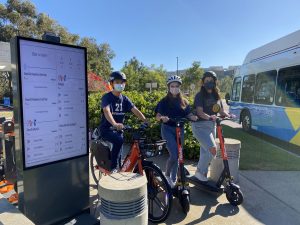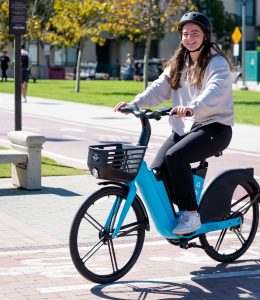Shared Micromobility Partners with Higher Education to Help Them Move
The start of the Spring semester and the steady return to in-person learning has prompted us to reflect on shared micromobility’s presence and role on higher education campuses. If you’ve spent some time on a college or university* campus, you may have experienced how difficult it can be to find parking, or perhaps quickly trek across campus on foot to arrive on time for a class. While shared micromobility’s role in college campus transportation does not make the news as often as some other topics, it is successfully being deployed to help solve these issues and is helping to make navigating campus life easier for everyone.
Shared micromobility helps campuses fill transportation gaps where needed and allow people to trade in their parking passes for a shared micromobility membership. In some cases, riders can benefit from a discount on that membership. For example, the Portland Bureau of Transportation (PBOT) announced that it will lower the cost of the Biketown bikeshare system for college students and people with low incomes.

“Campus programs truly are an integral part of our business at Spin and in many ways a perfect use case for micromobility,” said John Lankford, Head of Campus Partnerships at Spin. “High population density, trip distances that are often between half a mile and two miles, and an enthusiastic student rider base make campus environments remarkably well-suited for scooters and bikes. We believe campus programs will continue to grow.” Spin operates at more than 26 universities across the United States, each varying in size, enrollment, and environment.
A 2019 report found that almost a third of the population of the university included in the study quickly adopted the bikeshare program launched on the campus. In only three months, there were more than 19,000 registered users and more than 165,000 trips taken. You can find another example of positive growth and adoption in Boulder, Colorado at the University of Colorado Boulder campus. In 2018, Boulder BCycle, a 300-bike system, underwent a system optimization resulting in 15 of their 45 stations serving CU Boulder and free system access for its students. These actions, along with the conversion to e-bikes, resulted in nearly 10,000 active CU Boulder student riders and more than 250,000 annual trips by the end of 2021, a roughly tenfold increase from the system’s launch ten years earlier.
“We learned that it’s important to make sure capital investments are put to good use by setting up membership programs and promotions to accompany system growth on campus,” said Kevin Crouse, Boulder BCycle General Manager. “It took time to gain the trust of key campus stakeholders and to find bikeshare champions at CU Boulder, but it led to a strong membership program funding partner in the CU Environmental Center and a program that requires little promotion, with students communicating the program to each other!”

Bird created a university-specific team focused on building tools tailored to the unique operating needs of colleges and universities and currently operates on more than 130 university campuses in the U.S. Both Spin and Bird have stated that minimal marketing was needed to increase acquisition of their services. Instead, both companies say that they focus their messaging on safe usage and education. These experiences, along with studies like the one cited above, demonstrate that shared micromobility is filling a need on college and university campuses and that it can provide long-term, mutually beneficial services.
“Since Bird began partnering with universities across the country in 2018, we have been thrilled to see more than 130 campuses and surrounding communities embrace our environmentally friendly transportation offerings. These partnerships provide students with a convenient and sustainable way to get around campus and explore nearby neighborhoods while taking a hands-on approach to working with communities to design programs that fit their unique needs,” said Austin Marshburn, Bird’s Head of University Partnerships.
Whether navigating campus or the larger community, shared micromobility helps students move around independently and provides additional campus and community benefits. NABSA’s 2020 Shared Micromobility State of the Industry Report for North America found that in 2020 more than 30 million shared micromobility trips replaced a car trip leading to an offset of approximately 29 million pounds of carbon dioxide emissions. The report also cited a study by Emory University that concluded that e-scooter programs led to an additional $921 in unplanned spending per scooter at food and beverage stores and quick service residents. Additionally, Bird found that in San Diego, one of the first cities to get Bird’s bikeshare program in September 2021, riders contributed an estimated $5M+ to local businesses on campus and in the surrounding area.
College and university partnerships can also be incredibly valuable to the industry in the form of research and development. Spin shared that it values opportunities to collaborate with faculty around research that advances the shared micromobility industry that becomes available through strategic partnerships. Ride Report said that they see these collaborations as a means to experiment, implement, and evaluate shared micromobility in this unique setting.
“Universities are great transportation laboratories and they tend to have a lot of characteristics that make them well suited to micromobility – high residential density, lower car ownership, and lots of infrastructure for riding bikes and scooters such as off-street paths. They can set a great example for the potential of micromobility to achieve transportation and climate goals,” said Michael Schwartz, Head of Customers and Policy at Ride Report.
Shared micromobility partnerships and collaborations with colleges and universities are trends that will continue and grow. Other systems working with higher education campuses include Capital Bikeshare in DC, Austin’s MetroBike, PeaceHealth in Eugene, OR, and many more.
“University partnerships are an important part of growing micromobility. Capital Bikeshare began forming partnerships with higher education institutions in 2018, and now has agreements in place to provide discounted memberships for every major university in the District of Columbia. This opportunity is available in cities all over the world,” said Aaron Goldbeck, NABSA Board Member and Transportation Planner & Micro Mobility Specialist for DDOT. “As NABSA members, our organizations are poised to learn from each other to continue this trend and strengthen the partnerships we develop. Speaking personally, I started using a bike for transportation in undergrad and never looked back. I want to make sure as many other students as possible have the opportunity to use low-cost sustainable transportation too.”
Shared micromobility services are becoming a sought-after and welcomed addition to campus life and we can expect to see more colleges and universities embracing shared micromobility and encouraging its adoption. Collaboration between shared micromobility and higher education will continue and increase as we work together to share experiences and learnings and improve the way our communities get around.
